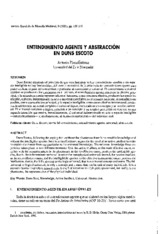Mostrar el registro sencillo del ítem
Entendimiento agente y abstracción en Duns Escoto
| dc.contributor.author | Pérez-Estévez, Antonio | |
| dc.date.accessioned | 2022-06-13T12:03:48Z | |
| dc.date.available | 2022-06-13T12:03:48Z | |
| dc.date.issued | 2002 | |
| dc.identifier.issn | 2530-7878 | |
| dc.identifier.issn | 1133-0902 | |
| dc.identifier.uri | http://hdl.handle.net/10396/23131 | |
| dc.description.abstract | Duns Escoto siguiendo el principio de que «sin fantasma no hay conocimiento sensible y sin especie inteligible no hay intelección», defiende Ia necesidad de Ia existencia del entendimiento agente para poder explicar el paso del conocimiento particular al conocimiento universal. El conocimiento universal objetivo se produce en dos momentos: en el primero, el entendimiento agente, como causa efectiva principal, y Ia naturaleza común representada en el fantasma, como concausa efectiva, producen Ia especie inteligible, universal indeterminado en acto o universal metafísico; en el segundo momento, el entendimiento · posible, como causa efectiva principal, y Ia especie inteligible, como causa efectiva instrumental, producen Ia intelección, universal completo o universal lógico, encarnado en un concepto y un nombre universal. El universal completo o lógico, reducido a un concepto y un nombre predicable de muchos, es una segunda intención que remite, inmediatamente, al universal indeterminado en acto o especie inteligible -intención primera-y, mediatamente, al fantasma representativo del individuo real. | es_ES |
| dc.description.abstract | Duns Scotus, following the saying that «without the phantasma there is no sensible knowledge and without the intelligible species there is no intellection>>, argues for the need of an active intellect in order to explain the transit from the particular to the universal knowledge. The universal knowledge from experience takes place in two different moments: first, the active intellect, as the main effective cause, together with the common nature in the phantasma, as the co-effective cause, produce the intelligible species, that is, the indeterminate universal in act or the metaphysical universal; second, the passive intellect, as the main effective cause, and the intelligibible species, as the effective instrumental cause, produce the intellection, that is, the full universal or the logic universal, that is a universal concept and name. The full universal or logical universal, is only a concept and a name that can be said of many individuals. It is a second intention that refers, immediately, to the first intention or intelligible species and, indirectly, to the phantasma, the representative of the physical individual. | es_ES |
| dc.format.mimetype | application/pdf | es_ES |
| dc.language.iso | spa | es_ES |
| dc.publisher | UCOPress | es_ES |
| dc.rights | https://creativecommons.org/licenses/by-nc-nd/4.0/ | es_ES |
| dc.source | Revista Española de Filosofía Medieval 9, 125-145 (2002) | es_ES |
| dc.subject | Duns Escoto | es_ES |
| dc.subject | Teoría del conocimiento | es_ES |
| dc.subject | Entendimiento agente | es_ES |
| dc.subject | Universal | es_ES |
| dc.subject | Abstracción | es_ES |
| dc.subject | Duns Scot | es_ES |
| dc.subject | Knowledge | es_ES |
| dc.subject | Active intellect | es_ES |
| dc.subject | Abstraction | es_ES |
| dc.title | Entendimiento agente y abstracción en Duns Escoto | es_ES |
| dc.type | info:eu-repo/semantics/article | es_ES |
| dc.relation.publisherversion | https://www.uco.es/ucopress/ojs/index.php/refime/index | es_ES |
| dc.rights.accessRights | info:eu-repo/semantics/openAccess | es_ES |

